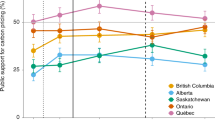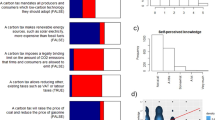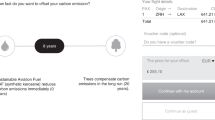Abstract
A carbon tax is widely accepted as the most effective policy for curbing carbon emissions but is controversial because it imposes costs on consumers. An alternative, ‘nudge,’ approach promises smaller benefits but with much lower costs. However, nudges aimed at reducing carbon emissions could have a pernicious indirect effect if they offer the promise of a ‘quick fix’ and thereby undermine support for policies of greater impact. Across six experiments, including one conducted with individuals involved in policymaking, we show that introducing a green energy default nudge diminishes support for a carbon tax. We propose that nudges decrease support for substantive policies by providing false hope that problems can be tackled without imposing considerable costs. Consistent with this account, we show that by minimizing the perceived economic cost of the tax and disclosing the small impact of the nudge, eliminates crowding-out without diminishing support for the nudge.
This is a preview of subscription content, access via your institution
Access options
Access Nature and 54 other Nature Portfolio journals
Get Nature+, our best-value online-access subscription
$29.99 / 30 days
cancel any time
Subscribe to this journal
Receive 12 print issues and online access
$209.00 per year
only $17.42 per issue
Buy this article
- Purchase on Springer Link
- Instant access to full article PDF
Prices may be subject to local taxes which are calculated during checkout




Similar content being viewed by others
Data availability
The raw data from all our experiments and statistical code for all analyses and figures reported in the paper and the supplementary information are available via the Open Science Framework at: https://osf.io/w4u5q/.
References
Allcott, H. Social norms and energy conservation. J. Public Econ. 95, 1082–1095 (2011).
Hedlin, S. & Sunstein, C. Does active choosing promote green energy use? Experimental evidence. Ecol. Law Q. 43, 107–141 (2016).
Benartzi, S. et al. Should governments invest more in nudging? Psychol. Sci. 28, 1041–1055 (2017).
Camerer, C., Issacharoff, S., Loewenstein, G., O’Donoghue, T. & Rabin, M. Regulation for conservatives: behavioral economics and the case for ‘asymmetric paternalism’. Univ. Pa. Law Rev. 151, 1211–1254 (2003).
Hall, M. G. et al. Public support for pictorial warnings on cigarette packs: an experimental study of US smokers. J. Behav. Med. 41, 398–405 (2018).
Thaler, R. H. & Sunstein, C. R. Libertarian paternalism. Am. Econ. Rev. 93, 175–179 (2003).
Thaler, R. H. & Sunstein, C. R. Nudge: Improving Decisions about Health, Wealth, and Happiness (Yale Univ. Press, 2008).
Allcott, H. & Rogers, T. The short-run and long-run effects of behavioral interventions: experimental evidence from energy conservation. Am. Econ. Rev. 104, 3003–3037 (2014).
Yoeli, E. et al. Behavioral science tools to strengthen energy & environmental policy. Behav. Sci. Policy 3, 68–79 (2017).
Loewenstein, G. & Chater, N. Putting nudges in perspective. Behav. Public Policy 1, 26–53 (2017).
Marteau, T. M., Ogilvie, D., Roland, M., Suhrcke, M. & Kelly, M. P. Judging nudging: can nudging improve population health? BMJ 342, d228–d228 (2011).
Levitt, S. D., List, J. A., Neckermann, S. & Sadoff, S. The behavioralist goes to school: leveraging behavioral economics to improve educational performance. Am. Econ. J. Econ. Policy 8, 183–219 (2016).
Madrian, B. C. et al. Behaviorally informed policies for household financial decisionmaking. Behav. Sci. Policy 3, 26–40 (2017).
Thaler, R. H. & Benartzi, S. Save more tomorrow: using behavioral economics to increase employee saving. J. Polit. Econ. 112, S164–S187 (2004).
Rogers, T. & Feller, A. Reducing student absences at scale by targeting parents' misbeliefs. Nat. Hum. Behav. 12, 335–342 (2018).
Nash, N. et al. Climate-relevant behavioral spillover and the potential contribution of social practice theory. WIREs Clim. Change 8, e481 (2017).
Thøgersen, J. Spillover processes in the development of a sustainable consumption pattern. J. Econ. Psychol. 20, 53–81 (1999).
Truelove, H. B., Carrico, A. R., Weber, E. U., Raimi, K. T. & Vandenbergh, M. P. Positive and negative spillover of pro-environmental behavior: an integrative review and theoretical framework. Glob. Environ. Change 29, 127–138 (2014).
Meijers, M. H. C., Verlegh, P. W. J., Noordewier, M. K. & Smit, E. G. The dark side of donating: how donating may license environmentally unfriendly behavior. Soc. Influ. 10, 250–263 (2015).
Tiefenbeck, V., Staake, T., Roth, K. & Sachs, O. For better or for worse? Empirical evidence of moral licensing in a behavioral energy conservation campaign. Energy Policy 57, 160–171 (2013).
Werfel, S. H. Household behaviour crowds out support for climate change policy when sufficient progress is perceived. Nat. Clim. Change 7, 512–515 (2017).
Fishbach, A., Dhar, R. & Zhang, Y. Subgoals as substitutes or complements: the role of goal accessibility. J. Pers. Soc. Psychol. 91, 232–242 (2006).
Loewenstein, G. & Ubel, P. Economics behaving badly. The New York Times A31 (15 July 2010).
Loewenstein, G. et al. A behavioral blueprint for improving health care policy. Behav. Sci. Policy 3, 53–66 (2017).
Sunstein, C. R. Do people like nudges? SSRN https://doi.org/10.2139/ssrn.2604084 (2016).
Interagency Working Group on Social Cost of Greenhouse Gases. Technical Update on the Social Cost of Carbon for Regulatory Impact Analysis—Under Executive Order 12866 (Office of Management and Budget, 2013).
Weber, E. in Psychological Perspectives to Environmental and Ethical Issues in Management (eds Bazerman, M., Messick, D., Tensbrunsel, A. & Wade-Benzoni, K.) 314–341 (Jossey-Bass, 1997).
Hansen, J., Marx, S. & Weber, E. The Role of Climate Change Perceptions, Expectations, and Forecasts in Farmer Decision Making: The Argentine Pampas and South Florida (International Research Institute for Climate Prediction, 2004).
Campbell, T. H. & Kay, A. C. Solution aversion: on the relation between ideology and motivated disbelief. J. Pers. Soc. Psychol. 107, 809–824 (2014).
Tannenbaum, D., Fox, C. R. & Rogers, T. On the misplaced politics of behavioural policy interventions. Nat. Hum. Behav. 1, 0130 (2017).
Davidai, S. & Shafir, E. Are ‘nudges’ getting a fair shot? Joint versus separate evaluation. Behav. Public Policy https://doi.org/10.1017/bpp.2018.9 (2018).
Reisch, L. A. & Sunstein, C. R. Do Europeans like nudges? SSRN Electron. J. 11, 310–325 (2016).
Dolan, P. & Galizzi, M. M. Like ripples on a pond: behavioral spillovers and their implications for research and policy. J. Econ. Psychol. 47, 1–16 (2015).
Acknowledgements
We thank R. Thaler and C. Sunstein for helpful comments and discussions. D.H. is grateful for funding from the Swiss National Science Foundation’s Doc.Mobility fellowship.
Author information
Authors and Affiliations
Contributions
All authors contributed equally to the development of the ideas and authoring of the paper. D.H. implemented the surveys and managed the data collection. E.H. performed the statistical analyses and D.H. assisted.
Corresponding author
Ethics declarations
Competing interests
The authors declare no competing interests.
Additional information
Journal peer review information: Nature Climate Change thanks M. Galizzi, A. Maki and S. Werfel for their contribution to the peer review of this work.
Publisher’s note: Springer Nature remains neutral with regard to jurisdictional claims in published maps and institutional affiliations.
Supplementary information
Supplementary Information
Supplementary Tables 1–12, Supplementary Notes 1–7, Supplementary Figures 1–9, Supplementary References and Supplementary Methods.
Rights and permissions
About this article
Cite this article
Hagmann, D., Ho, E.H. & Loewenstein, G. Nudging out support for a carbon tax. Nat. Clim. Chang. 9, 484–489 (2019). https://doi.org/10.1038/s41558-019-0474-0
Received:
Accepted:
Published:
Issue Date:
DOI: https://doi.org/10.1038/s41558-019-0474-0
This article is cited by
-
Choosing to live environmentally childfree: private-sphere environmentalism, environmental activism, or both?
Current Psychology (2024)
-
How do we reinforce climate action?
Sustainability Science (2024)
-
Going beyond the individual level in self-control research
Nature Reviews Psychology (2023)
-
Animal welfare is a stronger determinant of public support for meat taxation than climate change mitigation in Germany
Nature Food (2023)
-
Non-monetary narratives motivate businesses to engage with climate change
Sustainability Science (2023)



